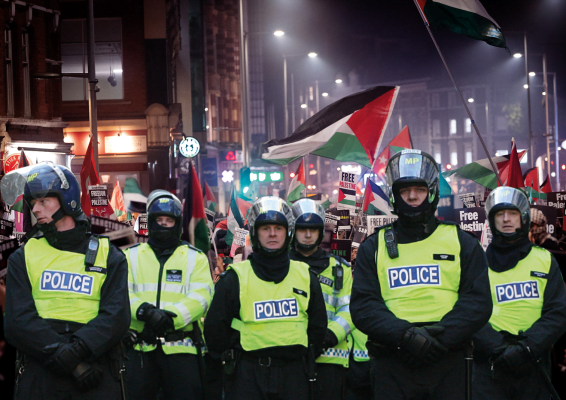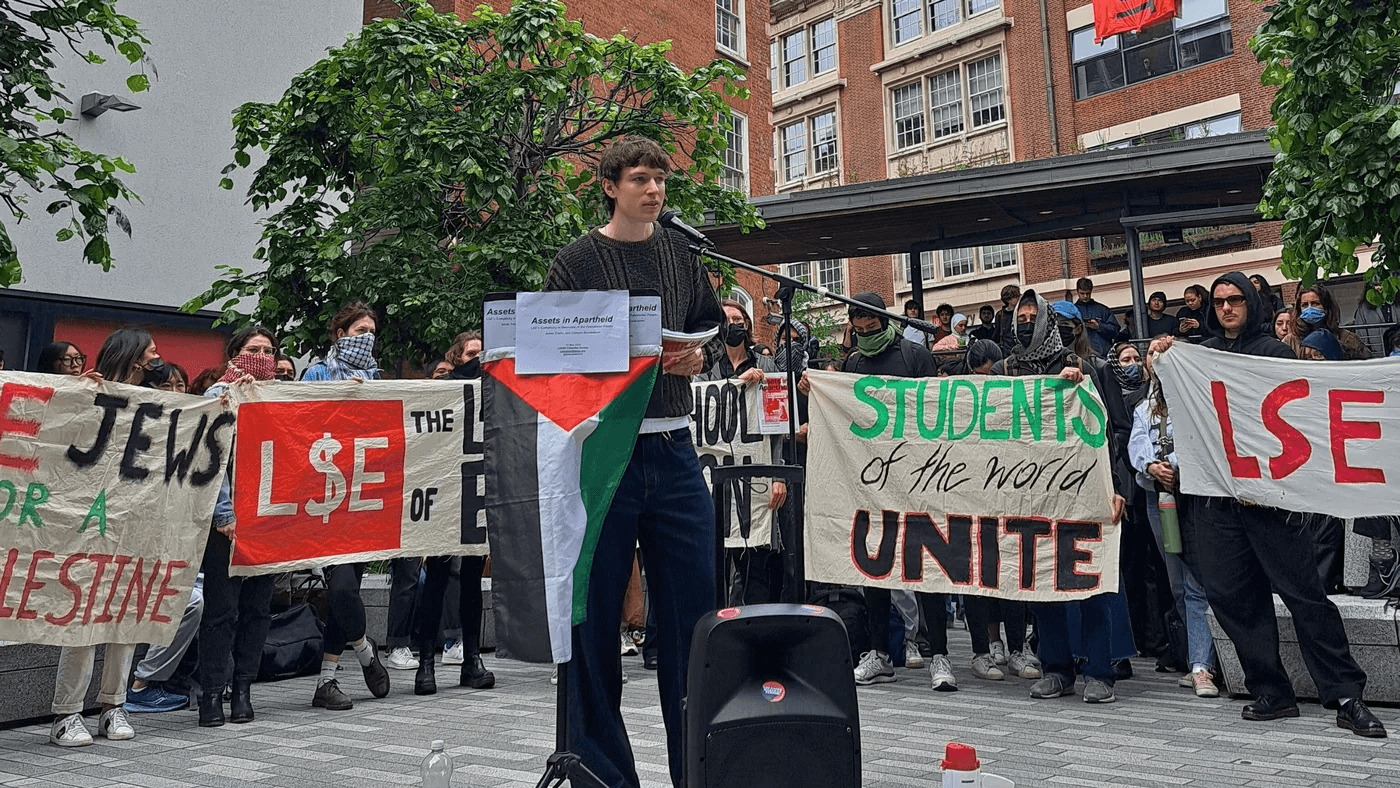In the past two weeks, university management have clamped down on students who dare to continue the struggle for Palestinian liberation.
In Oxford, Birmingham, and Leicester students have faced arrest, fines, and hospitalisation.
The dedication of these students is commendable. The most politically conscious activists can see that the ceasefire – if it holds – simply means that Gaza will go from being a slaughterhouse back to the world’s biggest open-air prison.
It is clear that the entire British establishment – including university management – supports the oppression of Palestine. However, it is precisely because of how entrenched their imperialist interests are that courageous acts alone will not be enough.
 Universities will never break with British imperialism solely due to the force of moral argument. Any “reputational damage” they suffer will be offset by the reputational advantage they gain in the eyes of the ruling class and big business, including arms companies.
Universities will never break with British imperialism solely due to the force of moral argument. Any “reputational damage” they suffer will be offset by the reputational advantage they gain in the eyes of the ruling class and big business, including arms companies.
After over a year of dedicated struggle, this wave of the Palestine movement has now drawn to a close. Such a level of tireless activity could not be sustained forever.
It is due to this ebb that activists now face repression at every turn. Taking their lead from the state, which recently carried out mass arrests of Palestine activists in London, university managers want to isolate the most militant individuals, and intimidate everyone else.
But the mass of workers and youth will not be reawakened by individual acts of sacrifice. At this stage, the repression brought on by isolated actions will only scare away broader layers.
What is needed is to win the political argument of how action by students and workers in Britain can ultimately win.
To halt British imperialism’s war machine for good requires mass action by students and workers throughout Britain. This struggle must be fought on a class basis, by raising socialist demands.
What is necessary as this wave of the Palestine movement draws to a close is to take stock of the lessons of the events since October 7 and beyond, and to organise and prepare for future struggles – which could emerge over any manner of issues.
Above all, it is not enough to decry the horrors of imperialism. Workers and youth need a clear perspective, correct demands and strategies, and a party to carry them out.
This is what we are building at the Revolutionary Communist Party. We invite you to join us.
Leicester students go on hunger strike
Since 15 January, five students at the University of Leicester have gone on hunger strike to show solidarity with eleven students who were arrested during a student occupation.
This coincides with university-issued “temporary exclusion orders”, in which student activists are barred from entering campus and attending lectures for undefined – and often extended – periods of time.
War profiteers have controlled our universities for long enough, using students’ tuition fees to maintain these blood-soaked bonds. Universities must be run and managed by those who actually use them – the staff and students. Only then can these institutions become genuine places of learning.
Leicester University student
Oxford students occupy university library
On 24 January, right in the heart of the city of Oxford, police officers scaled down the Radcliffe Camera – the University of Oxford’s main library – with ropes, in order to arrest 13 Oxford Action for Palestine (OAP) protestors.
Hundreds of protestors filled the streets in support of those who braved arrest by entering the library and securing themselves on the ledge of the windows. This encirclement of the library lasted for around five hours, punctuated with multiple scuffles with the police.
More than 650 faculty members and thousands of students have endorsed the manifesto of OAP. But this hardly bothers the administration, which prefers to stand with imperialism.
Let this remind us that the class complicit in the bombing of Palestine is also the same class responsible for turning our universities into corporate cash-cows.
Jatin Abhir, Oxford University
View this post on Instagram
University of Birmingham hits students with £60k of legal fees
After being evicted from campus last year, and hit with £60,000 in legal fees, the encampment at the University of Birmingham is back – this time just outside the university gates.
The university has threatened to expel two key members of the encampment (the “UoB 2”). The encampment is demanding that these disciplinaries be dropped, in defence of their right to protest.
Last year’s encampment had about 60 tents at its peak, alongside hundreds of people stopping by each day.
In this new encampment, despite its current small size, members are hosting events frequently, in order to get more people involved. And they are engaging in lots of discussions with people that stop by as they walk in and out of campus – and many do sympathise.
But despite all this, the encampment has not gained many permanent members. Decision-making processes have contributed to this, involving lengthy meetings where not everybody is able to show up and have their say.
Importantly, the camp’s organisers have no perspective or strategy for how to broaden the movement and win justice for the UoB 2.
Now is the time to prepare for when the student movement inevitably resurges.
April Winchester, Birmingham University
LSE bosses smear students as “terrorists”
The London School of Economics (LSE) hosted a lecture in December on ‘free speech on campus’, chaired by the LSE President, Larry Kramer.
However, as seven LSE students found out last summer, this ‘free speech on campus’ is nothing more than a façade. In fact, if you dare exercise it, you risk being branded a “terrorist”.
Despite professing a policy of ‘ethical investment’, the LSE bosses have £89 million invested in the arms industry and the fossil fuel sector.
When students took action against this by organising Palestine solidarity encampments last year, the LSE became the first UK university to shut down an encampment.
In response, seven students demonstrated at the LSE’s Summer School last year, calling on the university to follow its own policies on ethical investments.
In return for exercising their ‘free speech on campus’, these students were prevented from setting foot on campus. They couldn’t even access their campus GP and wellbeing services.
All of this in spite of the fact that students pay between £9,535 and £30,000 in tuition fees!
If this was not enough, leaked emails reveal that the LSE bosses shamefully described the protestors as “looking like terrorists” when pictured wearing keffiyehs – a traditional Palestinian headscarf.
Shockingly, one senior member of staff went as far to say that people had “genuinely feared” that a terrorist attack was going to take place, because the students’ protest happened to have taken place on the anniversary of the 2005 London bombings!
So, while Zionist LSE professors such as Benny Morris are allowed to exercise their freedom of speech with statements such as “I’d rather be racist than a bore”, young people who dare to challenge the bloodsoaked profits of their universities – these supposed beacons of free expression and learning – are suspended smeared as terrorists.
Tarik A, London School of Economics






